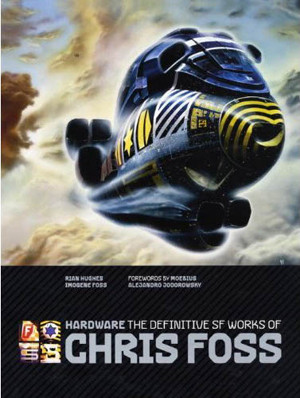For more than 75 years, Kirkus Reviews has served as the industry bible for bookstore buyers, librarians, and ordinary readers alike. Now Popdose has joined the Kirkus Book Bloggers Network, taking to the virtual pages of Kirkus Reviews Online to dish on the best — and sometimes the worst — in pop-culture and celebrity books.
Today, the publishing world brings us a book that’s largely about publishing — with a gorgeous art book celebrating an unsung hero whose cover illustrations helped to brand one of the industry’s greatest success stories…
 Odds are you don’t know Chris Foss’s name, but if you were reading science fiction during the 1970s and ’80s, you’ve surely seen his work. His images of great grimy machines — spacecraft and earthcrawlers, their gaudy stripes and checks emphasizing the perspective, giving depth and scale to their bulk against airbrushed starfields or planetscapes — adorned many a paperback cover. These are strong and evocative pictures, and the visual aesthetic that Foss pioneered in the book trade and (albeit briefly) as a film production designer has proved hugely influential. You can discern the fingerprints of Chris Foss in the weathered hull of Joss Whedon’s Serenity and in Battlestar Galactica‘s ragtag fleet, in the brutalist military machinery of Avatar and in half a hundred video games.
Odds are you don’t know Chris Foss’s name, but if you were reading science fiction during the 1970s and ’80s, you’ve surely seen his work. His images of great grimy machines — spacecraft and earthcrawlers, their gaudy stripes and checks emphasizing the perspective, giving depth and scale to their bulk against airbrushed starfields or planetscapes — adorned many a paperback cover. These are strong and evocative pictures, and the visual aesthetic that Foss pioneered in the book trade and (albeit briefly) as a film production designer has proved hugely influential. You can discern the fingerprints of Chris Foss in the weathered hull of Joss Whedon’s Serenity and in Battlestar Galactica‘s ragtag fleet, in the brutalist military machinery of Avatar and in half a hundred video games.
…. Always, Foss’s machines have a plausibility to them, an industrial solidity. These ships and installations are objects for use, not for display. Not new, and not pretty. Their deck-plating is scuffed with many footfalls, the brushed steel of the hatch-handles worn slick and shiny.
For all the evidence of use, though, there’s little sign of users in Foss’s SF work; the human figure is virtually absent from the scenes — ironic, given that his most-seen work overall remains the line drawings he did for Dr. Alex Comfort’s 1972 bestseller The Joy of Sex. Those pictures (not reproduced in Hardware, and only glancingly mentioned) are a singular achievement; neither sensational not pornographic, they render their subjects with rare sensitivity. Above all they are profoundly human, more naked in their truth than any nude, vulnerable in their unidealized bodies, pot-bellies, armpit hair, and all.
The absence of this aspect of Foss’s talent from Hardware is telling, I think, and reflects on the marketing practices of science fiction….
Read the rest of this article at Kirkus Reviews!





Comments